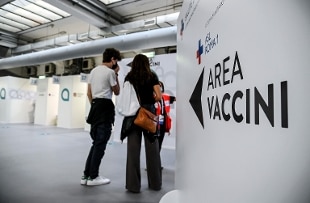Ema: vaccine mix could be used, but little data so far
Vaccines, Lazio asks the ministry for an opinion for those who want to recall AstraZeneca
Aifa, Magrini: "Be more than calm about vaccine mixes"
Vaccini, Figliuolo: "Revision of the plan? Balanced doses in 11 Regions"
Vaccini, the Spallanzani Institute launches a study on the effectiveness of the mix of doses
Vaccine: Aifa green light for a mix of vaccines for under 60s
Share
June 18, 2021 `` The figures speak for themselves: we have exceeded 44 million administrations. It means that over 14.8 million people are vaccinated, with the first and second doses, and that over 29.2 million people have been given a first dose. Out of an audience of more than 54 million theoretically vaccinable people, over 54% have received at least one dose. But what matters is the sharp decline in ICU admissions. If Italy is reopening and rediscovering the taste of the future, as President Mario Draghi said, we owe it to the country's enormous choral effort ''. The extraordinary commissioner for the Covid emergency general Francesco Figliuolo says this in an interview with
Il Giornale.
On heterologous vaccination and the possible risks '' I take note of the scientific evidence. There are two clinical studies, published in the last two weeks in Spain and in Great Britain, which show good results in terms of antibody response and safety regarding the so-called heterologous vaccination. Undoubtedly, all the changes that have taken place regarding the use of vaccines may have generated perplexity, but a global vaccination campaign is characterized by great dynamism. One thing remains central: the best protection of everyone's health, in a context where zero risk does not exist ''.
For Figliuolo there will be no repercussions on the plan which, he emphasizes, '' remains sustainable. Between now and the end of September, the total use of over 54.5 million mRNA vaccines is expected and we will be able to cover 80% of the audience to be vaccinated. In the period from June to September, it will take approximately 990,000 doses to complete the vaccination cycle for under-60s who had received the first dose of AstraZeneca. For the month of June, special distributions have already begun starting from the 14th to satisfy this extra need, while for July and August a schedule is underway that will allow the complete satisfaction of all needs. Failure to approve the Curevac vaccine will not impact on achieving the goals. ''
Remuzzi: "More effective vaccine mix, we have the evidence "
"Research done so far confirms that the vaccine mix not only works but ensures better coverage."
Giuseppe Remuzzi, director of the Mario Negri Irccs Institute of Pharmacological Research,
writes in
Il Corriere della Sera
. "Could it be that in proposing the recall with Pfizer or Moderna in those who had already done AstraZeneca, CTS and the government they let themselves be conditioned by the death of the girl from Sestri Levante?", Remuzzi asks. "Doing the first dose with a certain vaccine and the second with another (they called it heterologous vaccination) is not something of today; two different vaccines were first tested in Paris 34 years ago for HIV and yes it was immediately clear that the idea was good ".
"Now those who work on HIV follow the path of heterologous vaccination (opened by Daniel Zagury at Pierre and Marie Curie University in 1987) and the same is done for Ebola, tuberculosis, Epstein-Barr and other diseases - continues the director - has already been done for Sars-CoV-2: Sputnik is in fact a heterologous vaccination, given that the adenovirus of the first dose is different from that of the second (and the interim analysis of phase three data demonstrates an efficacy 91.6% and a good tolerance) ". Before reaching humans, researchers tried all possible combinations in animals, to conclude that the heterologous allows the immune system to recognize and neutralize the intruder; in our case the virus; in different regions and this increases the effectiveness of vaccination.For Sars-CoV-2 the combination of the two vaccines exploits the peculiarities of each of the two: AstraZeneca generates T (killer) lymphocytes that attack the cells infected by the virus and then destroy them; mRna vaccines, on the other hand, mainly provoke an antibody response ", he warns.
"How do we know? From the Spanish study: 663 people under 60, who had already received AstraZeneca, received Pfizer-BioNTech after 8 weeks. Preliminary data, announced on May 18, show that heterologous vaccination is highly immunogenic and it generates antibodies that recognize and inactivate Sars-CoV-2 (in laboratory tests) more than has ever been seen with any combination of homologous vaccines, "Remuzzi recalls. Then there is a study done in Germany by the virology department of the University of Ulm. "It is true they are not yet published but they will be soon and anyone can see them in 'medRxiv' in the form of a non-definitive publication, accessible to the scientific community. It is - Remuzzi reconstructs - 26 people who received AstraZeneca,followed after 8 weeks by Pfizer, in which there was a powerful immune response and above all an increased reactivity of T cells against Sars-CoV-2. But the most interesting part of this study is that, at least in laboratory tests, the serum of subjects treated with two different vaccines inactivates the English, South African and even the Indian variants (it is called delta and is the one we are all so afraid of) ".South African and even the Indian one (it is called delta and it is the one we are all so afraid of) ".South African and even the Indian one (it is called delta and it is the one we are all so afraid of) ".

